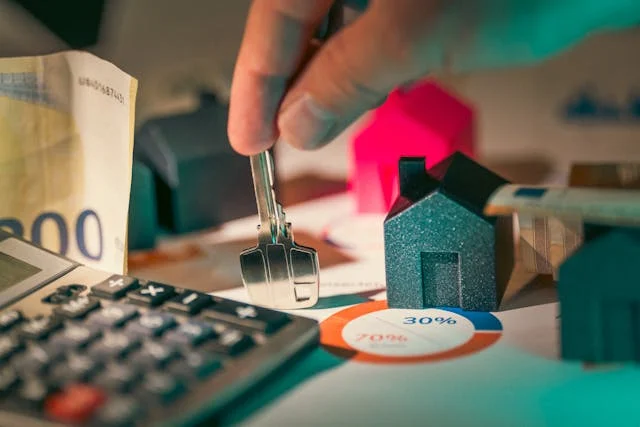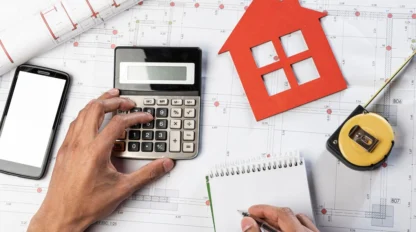Why Are Mortgage Rates So High?

If you’re planning to buy your first home or move to a new one, you’ve probably been watching mortgage rates climb with some concern. As of October 17, 2024, the average rate for a 30-year fixed mortgage in the U.S. hit roughly 6.5%, marking the third straight week of increases. This was after standing at 6.52% just a few days earlier, on October 11.
And it’s not just future homeowners feeling the pinch. Over 1.5 million homeowners plan to remortgage this year, many hoping for lower rates. Instead, they’re facing the opposite. So, what’s driving these rates upward?
Why Mortgage Rates Are Increasing
There are a few key reasons mortgage rates are going up. Here are some of them:
1. Inflation
In the second quarter of 2024, inflation was a key factor affecting the housing market. For new houses, the annual inflation rate hit 6.8%, while existing homes saw a 2.6% increase. This means that, on average, new houses became significantly more expensive over the years compared to existing ones.
According to CoreLogic, home prices rose by 3.9% from August 2023 to August 2024, and although prices are expected to keep rising, the rate will likely slow to 2.3% by August 2025.
But, if inflation stays high, central banks like the Federal Reserve may continue raising interest rates to try to control it. When inflation rises, the value of money decreases over time, so lenders demand higher interest rates to ensure they make up for it.
If central banks keep hiking rates, it directly affects mortgage lenders’ costs, and those higher costs are passed on to borrowers in the form of more expensive mortgage rates.
2. Economic Growth
When the economy is doing well, more people feel confident enough to buy homes, which means demand for mortgages goes up. As more buyers enter the market, lenders often raise rates to keep up with this increased demand.
On the other hand, if the economy slows down, mortgage rates tend to drop because fewer people are looking to borrow. So, if you see strong economic growth, expect mortgage rates to inch up as well.
3. Federal Reserve Policy
The Federal Reserve or Feds is a major player when it comes to interest rates. While they don’t set mortgage rates directly, their decisions have a big impact.
When the Fed raises its benchmark interest rate to control inflation or boost the economy, borrowing costs—including mortgages—rise.
But if the Fed signals that it might lower rates, mortgage rates could drop too. Keep an eye on the Fed’s moves, as they can significantly influence what you’ll pay for your loan.

4. Global Events
Global events can impact your mortgage rate too. When there’s geopolitical uncertainty—like conflicts or economic crises—investors tend to move their money into safer investments like U.S. bonds.
This can reduce the amount of funding available for mortgages, causing lenders to raise rates. Global events may seem far away, but they can have a very real effect on what you pay for your home.
5. Borrowing Costs
Borrowing costs are rising, and one key reason for this is the influence of the Federal Reserve. If you’re thinking about buying a home, you need to understand how the Fed’s actions impact mortgage rates.
The Federal Reserve sets a benchmark interest rate, and while this doesn’t directly dictate mortgage rates, it sets the tone for borrowing costs, from mortgages to credit cards.
When the Fed raises rates to combat inflation or cool the economy, it increases the cost of borrowing for lenders. Mortgage lenders anticipate these moves and adjust their rates accordingly, often raising them in response to hikes in the Fed’s rate.
Lenders also base their funding costs on predictions of what the Fed will do next. If they believe the Fed is going to continue raising rates, they might increase mortgage rates in advance to stay ahead of the curve.
This is why you may notice mortgage rates climbing even before the Fed officially announces changes.
6. Your Financial Profile
Your personal financial health plays a big role in the mortgage rate a lender offers you. Lenders look at factors like your credit score, down payment, and debt-to-income ratio to determine how risky it might be to lend to you.
A high credit score and large down payment will typically fetch you better rates, and a high debt-to-income ratio may also make lenders to offer you higher rates due to the perceived risk of lending.
If you’re in a position where your financial profile is less than ideal, this can push your mortgage rate higher than average.
7. Housing Market and Bond Demand
Mortgage rates are heavily influenced by the demand for mortgage-backed securities (MBS) in the bond market. When investors feel confident about the housing market, they buy more MBS, helping to keep mortgage rates lower.
However, if there are concerns about rising mortgage defaults, investors may pull back from buying these securities. This lack of demand causes bond yields to increase, and mortgage rates follow.
Right now, if investors are worried about future economic uncertainty or housing instability, that could be a key reason why mortgage rates are staying high.

How to Deal With With High Mortgage Rates
Even with the current high mortgage rates, there are still ways to get around it, like:
- Improve your credit score: A higher credit score can help you secure better mortgage rates. Pay off debts, lower your credit utilization, and make timely payments to improve your score.
- Consider a large down payment: A larger down payment can reduce the amount you need to borrow and potentially qualify you for a lower interest rate, as it reduces the risk for the lender.
- Shop around: Different lenders offer different rates. By shopping around, you can compare offers and potentially find a better deal. Even a small difference in rates can save you thousands over the life of your loan.
- Lock in your rate: If you find a good rate, consider locking it in. Mortgage rates can fluctuate, and locking a rate protects you from potential increases during the closing process.
- Explore Adjustable-Rate Mortgages (ARMs): ARMs typically start with lower rates than fixed-rate mortgages. While the rate can increase after an initial period, they may be a good option if you plan to sell or refinance before the rate adjusts.
- Refinance when rates drop: If mortgage rates decrease in the future, you can refinance your loan to take advantage of the lower rate and reduce your monthly payments.
- Budget accordingly: With higher rates, your monthly payments will be larger. Be sure to adjust your budget to accommodate these increased costs, cutting down on non-essential spending where possible.
Sell Your Home Hassle-Free with Grandview Homes!
If rising mortgage rates have you feeling uncertain about buying or selling your home, Grandview Homes is here to help.
We offer a faster, simpler alternative with a cash offer for your home in as little as 24 hours—no need to worry about navigating high interest rates or lengthy processes. Skip the stress of traditional real estate transactions and get good value for your property without the hassle.
Visit Grandview Homes today to see how we can help you sell your house, even in this challenging market!


